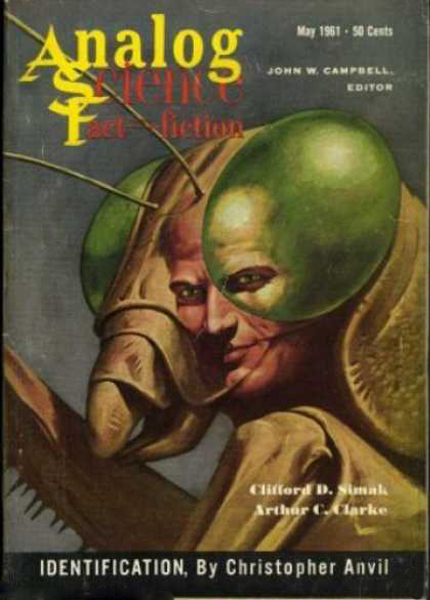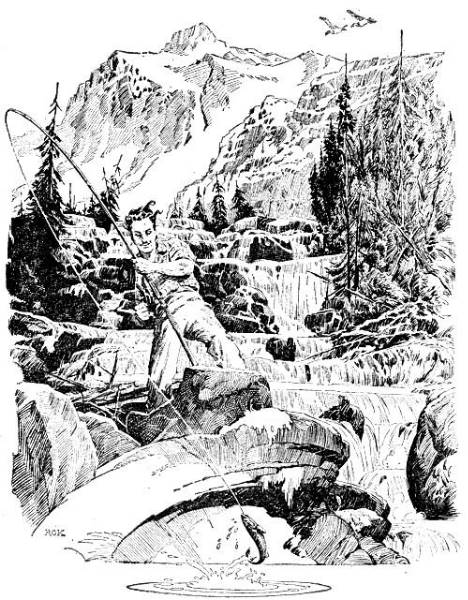Gideon Marcus, age 42, lord of Galactic Journey, surveyed the proud column that was his creation. Three years in the making, it represented the very best that old Terra had to offer. He knew, with complete unironic sincerity, that the sublimity of his articles did much to keep the lesser writers in check, lest they develop sufficient confidence to challenge Gideon's primacy. This man, this noble-visaged, pale-skinned man, possibly Earth's finest writer, knew without a doubt that this was the way to begin all of his stories…
…if he wants to be published in Analog, anyway. One might suggest to John Campbell that he solicit stories with more subtle openings. To be fair, the May 1961 isn't actually that bad, but every time a piece begins in the fashion described above, I feel like I've discovered a portal to 1949's slush pile.

Case in point is Chris Anvil's Identification. I know Chris has got a good story in him somewhere, but not when he submits to Campbell. This tale is about the use of actual bugs, psychically linked to a human operator, to eavesdrop on and prevent potential instances of crime. It's not a bad premise, but the story is too padded at the beginning and end, and too clunky in the middle. Two stars.
Arthur C. Clarke's Death and the Senator, on the other hand, is very good. What evil irony for an anti-space politician when it turns out that space offers the cure to a fatal heart condition. An intense, personal story, with some plausible speculation on the world circa 1976. Four stars.
I can perhaps forgive Join our gang? for being Sterling Lanier's first piece. It is the distillation of all that is wrong with Analog — not only is the Terran Empire the strongest force in the universe, but the animals of Earth are the toughest in the universe. And preventative genocide is acceptable diplomacy. I can't make this up, folks! Two stars.
The teeter-totter goes up again with James Schmitz's Gone Fishin', as one might expect given his quite good Summer Guests from a couple of years back. It starts out with the same hoary formula, but where it goes is quite surprising. It's basically the The Door through Space concept done right. Three stars; there's gold in there, but it gets docked for the slow beginning and the somewhat know-it-all air at the end.

There's a G. Harry Stine "non-fiction" article. It's not worth reprinting, this piece about how science fiction writers are too conservative in their predictions given how fast everything is moving these days. He includes a bunch of asymptotic curves that indicate, among other things, that we will have hyperdrive by 1980 and crushing overpopulation by the end of the century. I believe that one should not interpret the trends of the last two decades as representative of a sustainable pace; rather, they represent a quantum jump to a new plateau. In support of this observation is Enovid, the new "birth control" pill that will, mark my words, blow a hole in Malthusian population growth predictions. Two stars.
The rest of the magazine comprises Part II of Cliff Simak's promising The Fisherman, which I won't spoil at this time. All told, it's a 3-star mag — imagine how much higher it could be if Analog's authors could figure out a better way to start their stories!

Something missing here?
"The teeter-totter goes up again with James Schmitz’s Gone Fishin’, as one might expect given his quite good The Door through Space concept done right. "
A printing error. I've phoned my editor, and new copies should read properly. Thanks!
Well, Campbell's pick turned out to be our reject pile again. I still have hopes for Anvil, but agree insects are not his long suit.
Mind you, I loved the hook about the lord of Galactic Journey!
Oh! Perhaps I'll begin every article that way!
"Join Our Gang?" — This really left a bad taste in my mouth. The "heroes" sure seemed like bad guys to me.
"Gone Fishing" — This was OK, I guess, but it sure took its time getting there.
Nothing to write home about, anyway.
The Schmitz does start slow, and in the manner I lampooned. Read the Clarke, if you get the chance…
I managed to track down a copy of "Death and the Senator" and was quite impressed. It's unusual to find such depth of characterization, emotional appeal, and poetic phrasings in "Analog." It also creates a very believable future. Excellent story.
I liked it a lot. I'm glad you did, too!
Someone once said that Campbell's editorial philosophy was "Earthmen über alles."
Ain't that the truth!
I'm getting flak from Campbell fans in some of my letters, but let's be honest — even Asimov got tired of working with the guy.
This is one of those well-known facts that proves on closer examination not to be 100% true. While Campbell is certainly a human chauvinist, he will set aside his prejudices for a story he likes enough, usually by a regular contributor. For example:
Ross Rocklynne, Quietus (1940): humanity has destroyed itself and there is only one breeding pair left; bird-like aliens drop in and kill the male. (But they’re sorry about it.)
Heinlein, By His Bootstraps (1941): our time traveler winds up in an era in which humans are reduced to slavery, or maybe pet-hood, by aliens. When he sees one of the aliens himself, the experience drives him temporarily insane. There’s no indication humans defeat them—apparently they just leave.
Heinlein, “They” (1941): a human—maybe the last human—is the victim or beneficiary of a scheme by all-powerful beings to maintain a fake world around him.
Heinlein, Methuselah’s Children (1941): the wandering Howard families are kicked out of not one but two star systems and return home utterly defeated.
C.L. Moore, Judgment Night (1943): humans think they are at the top of the heap, but things are really run by some lemur-like creatures, who by the end of the novel are sufficiently fed up with humanity that they are going to put somebody else in the top spot.
Kuttner/Moore, The Children’s Hour (1944): guy’s girlfriend turns out to be one of the young of a species of godlike aliens, and when he gets troublesome about it they just wipe his memory.
Russell, Hobbyist (1947): guy is spacewrecked on a planet dominated by a mysterious being who appears to be creating life.
Fyfe, Protected Species (1951): humans get to Alpha Centauri, discover ruins, wonder whose they are. An alien steps out from behind a rock and says “They are not ours. They are yours.” They’ve been watching over us the whole time.
Simak, Neighbor (1954): alien lands, sets up shop, doesn’t want to be bothered, so there’s a county or so rendered completely incommunicado, and nobody can do anything about it.
Simak, Immigrant (1954): humanity is a very junior member of the fellowship of sentients, and humans selected to go to the aliens’ planet don’t even understand how much they are condescended to.
A. Bertram Chandler (as George Whitley), Familiar Pattern (1959): aliens land, things look OK for a while, but their religion starts to gain adherents, there’s a violent reaction from humans, and the aliens kick ass. The Polynesian character tells the white Australians at the end: “Now it’s your turn.”
It certainly seems like they get rarer as time goes on!
Thank you for that excellent list, John. I liked the Chandler story a lot.
I am looking for a story I read long ago in Analog–a time travel piece called "A Knight There Was". Does this ring any bells?
You must have read a typed draft somewhere. Robert F Young hasn't had it published yet.
That's right. I've never head of the story. Sounds interesting, though!
I consider "Death and the Senator" to be one of Clarke's strongest pieces to date, largely because of the well-drawn characters and the way in which he makes the personality change in the protagonist so believable.
"Gone Fishing", by contrast, seems like a clumsier attempt at showing the same kind of psychological shift. Schmitz rarely disappoints, and I still wouldn't call this one a disappointment, but it's not one of his best. OTOH, it does lead the reader (or at least this reader) to reflect on what their own response would be to 5 years of extreme isolation, albeit with sources of entertainment and mental stimulation available. I suspect that I would have started writing science fiction!
I agree with both of your evaluations. I feel like Fishing needed… more. But I don't know that Schmitz is yet able to make that kind of fleshing out interesting. It certainly wasn't a twist I expected, however!
You certainly captured that standard opening perfectly. And it feels like every story in this issue started that way (well, except for Clarke, of course). Possibly the oddest thing about that is that it was Campbell himself who stated moving science fiction away from those hoary old pulp tropes. Sure he still insists on iron-jawed (white) Earthmen triumphing over everything, but rarely does he allow this sort of 1930s style to bleed through any more. Doc Smith would be embarrassed by some of this stuff.
"Join Our Gang" really does feel like the heroes are the bad guys. The destruction of native habitats just to force people to join your political/economic group? What horrible people!
I have a very on and off relationship with James Schmitz. Some of his stuff I really love, some I just can't get into at all. "Gone Fishing", alas, fell into the latter category. Maybe it was the way it started, coming right after that Lanier. But it utterly failed to hold my attention at all.
I would say that Stine is both right and wrong about science fiction authors being too conservative. As you say, the current pace of technological development is not one that can be maintained for any extended period of time. On the other hand, there will be unexpected off-shoots and unintended consequences that will produce things that no one expects. This new birth control pill will have any number of consequences; add in the major advances that have been made in agriculture and we've knocked Malthus into a cocked hat. I suspect that the things we will see from the space program that really affect most people will come from things like the medical monitoring of the astronauts or the global communications protocols that are being used. Flying cars? Forget about it (and what a nightmare that would be!). Vacations on the Moon? Well, I hope so.
So not a great issue this month. Disappointing after the last couple of rather good months. Let's hope this is an aberration and not a return to the mean.
Analog has been wildly inconsistent this year.
January: 2.5 stars (on a 1 to 5 scale, 3 being decently entertaining)
February: 3 stars
March: 3.5 stars
April: 2.5 stars
May: 3 stars
Analog has not been my favorite mag for any of the months this year thus far, though it tied for 1st with F&SF in March.
There have been some bright spots, though: Cole’s The Weakling, Reynold’s Freedom, Anderson’s Hiding Place (5 stars!), Clarke’s Death and the Senator, and Simak’s The Fisherman (which I have not finished).